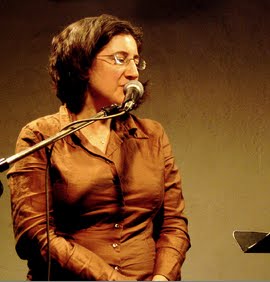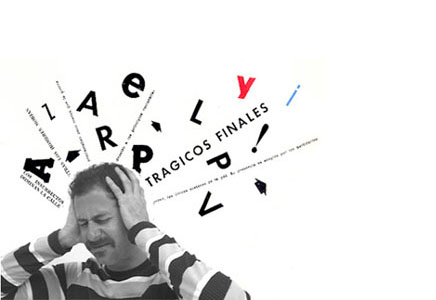 LISTEN TO THE SHOW
LISTEN TO THE SHOWListening to this show, this discussion of Barbara Guest’s casually and yet densely allusive poem “Roses,” you will hear about Juan Gris-style cubism circa 1912 (in his own “Roses”), about William Carlos Williams’ famous celebration in “The rose is obsolete” of a new kind of rose – the metal rose, the sharp-edged rose, the lovely unlovely rose – and also about a memory from the age of 8 that Gertrude Stein often retold as a way of explaining her views on the difference between art and nature. Is that difference a problem – an anxiety, a cause for reluctance - for the modernism-conscious poet who comes after modernism, such as indeed Guest, who has an instinct to make room in her writing for the ill person requiring real air to breathe?
 Al and sometimes the other PoemTalkers felt that this is a rebuke of modernist airlessness. Natalie Gerber (at right) and sometimes the others felt that this is more likely an expression of skepticism about postmodern art and perhaps a fresh return to the moment of 1912 – the thrilling New Era of collage-y paintings such as Gris' “Roses,” which is (arguably) dated 1912 and which was a canvas Gertrude Stein herself owned. Randall Couch points out that the poem looks at a fork or divergence in the modernist evolution or modernist family tree, a turning point Guest feels is worth going back to. Michelle Taransky (at left) notes that the art in the poem is an art already encountered even as the poem itself imagines the possibilities of a fresh encounter.
Al and sometimes the other PoemTalkers felt that this is a rebuke of modernist airlessness. Natalie Gerber (at right) and sometimes the others felt that this is more likely an expression of skepticism about postmodern art and perhaps a fresh return to the moment of 1912 – the thrilling New Era of collage-y paintings such as Gris' “Roses,” which is (arguably) dated 1912 and which was a canvas Gertrude Stein herself owned. Randall Couch points out that the poem looks at a fork or divergence in the modernist evolution or modernist family tree, a turning point Guest feels is worth going back to. Michelle Taransky (at left) notes that the art in the poem is an art already encountered even as the poem itself imagines the possibilities of a fresh encounter.As Natalie aptly puts it, we are discussing a poem that is testing out its stance in response to the modernist approach to representation.
Here's one version of Gertrude Stein's telling of her early encounter with painting:
It was an oil painting a continuous oil painting, one was surrounded by an oil painting and I how lived continuously out of doors and felt air and sunshine and things to see felt that this was all different and very exciting. There it all was the things to see but there was no air just was an oil painting. I remember standing on the little platform in the center and almost consciously knowing that there was no air. There was no air, there was no feeling of air, it just was an oil painting and it had a life of its own.
 Williams saw Juan Gris' "Roses" (also called "Flowers") and it is widely considered to be the source of "The rose is obsolete."
Williams saw Juan Gris' "Roses" (also called "Flowers") and it is widely considered to be the source of "The rose is obsolete."This phrase in Guest's poem - "shoe which never floats / and is stationary" - refers, as Randall reminds us, to the painting by Fragonard whose famous short title is "The Swing": the young lady swinging upward lets fly her slipper, which the painter catches in mid-air. And what kind of air is that? (Here again this was a scene Williams pondered, in his anti-descriptive poem "Portrait of a Lady." What kind of man is Fragonard, asks WCW there.)
Roses
“painting has no air . . .”
—Gertrude Stein
That there should never be air
in a picture surprises me.
It would seem to be only a picture
of a certain kind, a portrait in paper
or glue, somewhere a stickiness
as opposed to a stick-to-it-ness
of another genre. It might be
quite new to do without
that air, or to find oxygen
on the landscape line
like a boat which is an object
or a shoe which never floats
and is stationary.
Still there
are certain illnesses that require
air, lots of it. And there are nervous
people who cannot manufacture
enough air and must seek
for it when they don’t have plants,
in pictures. There is the mysterious
traveling that one does outside
the cube and this takes place
in air.
It is why one develops
an attitude toward roses picked
in the morning air, even roses
without sun shining on them.
The roses of Juan Gris from which
we learn the selflessness of roses
existing perpetually without air,
the lid being down, so to speak,
a 1912 fragrance sifting
to the left corner where we read
“La Merveille” and escape.
"Roses" was included in Guest's book Moscow Manions (1973). The Barbara Guest PennSound page is here, and of course it includes a recording of Guest reading "Roses". The recording was made at Artist's Access Studio, New York, New York, May, 1984. The producer was Anne Becker, and the recording engineer was Peter Darmi. Our PoemTalk engineer was James LaMarre and our editor was, as always, Steve McLaughlin.


























